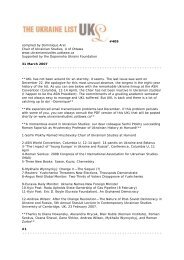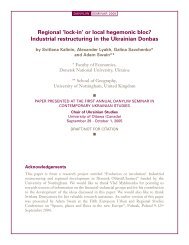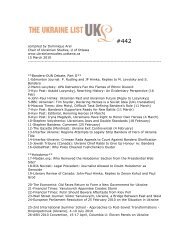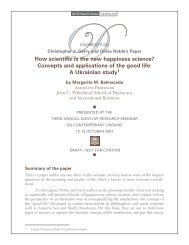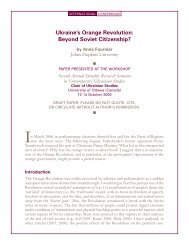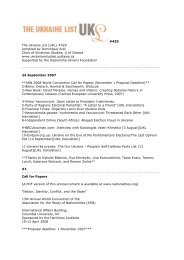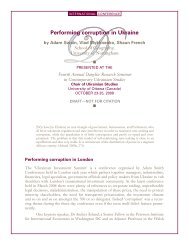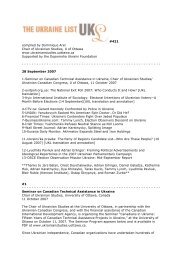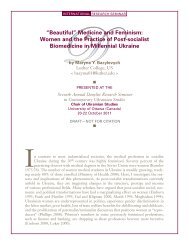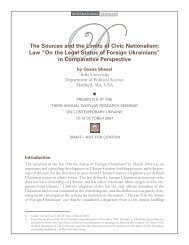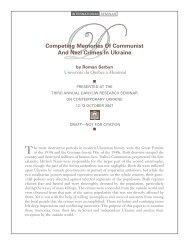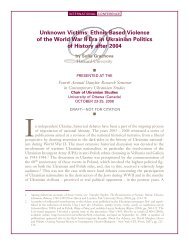Citizenship and nation-building in Ukraine - Chair of Ukrainian Studies
Citizenship and nation-building in Ukraine - Chair of Ukrainian Studies
Citizenship and nation-building in Ukraine - Chair of Ukrainian Studies
You also want an ePaper? Increase the reach of your titles
YUMPU automatically turns print PDFs into web optimized ePapers that Google loves.
INTERNATIONAL CONFERENCE<br />
The center favored Ukra<strong>in</strong>ian statehood for pragmatic reasons: it was better to be a president<br />
<strong>of</strong> a country than a governor <strong>of</strong> a prov<strong>in</strong>ce. If they wanted to rule an <strong>in</strong>dependent<br />
state, however, the state’s <strong>in</strong>dependence had to be justified <strong>and</strong> secured. One way to do<br />
so was by adopt<strong>in</strong>g citizenship law – itself a statehood legitimat<strong>in</strong>g mechanism. Def<strong>in</strong><strong>in</strong>g<br />
the <strong>nation</strong> by the territory <strong>of</strong> the state was further politically expedient for the center<br />
because it allowed the center to ma<strong>in</strong>ta<strong>in</strong> neutrality <strong>in</strong> the ideological debate on the<br />
<strong>nation</strong>al question between the left <strong>and</strong> the right. The center could thus cont<strong>in</strong>ue to cast<br />
itself as an alternative to both “communists” <strong>and</strong> “<strong>nation</strong>alists,” <strong>and</strong> could protect itself<br />
from be<strong>in</strong>g pa<strong>in</strong>ted as “anti-Russian” by the left or as “anti-Ukra<strong>in</strong>ian” by the right.<br />
3. Possible directions for future research.<br />
This paper began with a contention that politics <strong>of</strong> citizenship policy can be a lens <strong>in</strong>to<br />
the larger process <strong>of</strong> <strong>nation</strong> <strong>and</strong> state-<strong>build<strong>in</strong>g</strong>. What does this lens reveal? I would argue<br />
that the politics <strong>of</strong> Ukra<strong>in</strong>ian citizenship policy <strong>of</strong>fers a clear demonstration <strong>of</strong> how civic<br />
<strong>nation</strong>ality policies may arise <strong>in</strong> the absence <strong>of</strong> civic <strong>nation</strong>al ideologies to <strong>in</strong>form these<br />
policies. The evidence from the Ukra<strong>in</strong>ian case also suggests an <strong>in</strong>trigu<strong>in</strong>g possibility that<br />
weak <strong>and</strong> contested <strong>nation</strong>al identity is not necessarily an obstacle to <strong>nation</strong>-<strong>build<strong>in</strong>g</strong>, <strong>and</strong><br />
may even be conducive to civic <strong>nation</strong>-<strong>build<strong>in</strong>g</strong>. These <strong>in</strong>sights from the Ukra<strong>in</strong>ian citizenship<br />
policy <strong>and</strong> politics also suggest several potentially fruitful directions for future research.<br />
One such research direction can be to <strong>in</strong>vestigate the relationship between <strong>nation</strong>al<br />
ideas <strong>and</strong> state policies on the <strong>nation</strong>. More specifically, to theorize a possibility that state<br />
policies may cause, rather than be caused by, <strong>nation</strong>al ideas. As discussed above, citizenship literature<br />
usually studies citizenship policies as a product <strong>of</strong> <strong>nation</strong>al ideas. Brubaker’s argument<br />
depicts a bottom-up process: certa<strong>in</strong> <strong>nation</strong>al self-underst<strong>and</strong><strong>in</strong>g forms historically,<br />
<strong>and</strong> then affects citizenship policies. But perhaps causal arrows should be reversed? In<br />
Ukra<strong>in</strong>e civic citizenship policy emerged <strong>in</strong> the absence <strong>of</strong> correspond<strong>in</strong>g <strong>nation</strong>al ideology.<br />
If a particular citizenship policy can emerge <strong>in</strong> the absence <strong>of</strong> support<strong>in</strong>g <strong>nation</strong>al<br />
discourse, a possibility that citizenship policy may <strong>in</strong>fluence identity discourse, rather<br />
than be<strong>in</strong>g <strong>in</strong>fluenced by it, should be considered. A possible causal cha<strong>in</strong> may be as follows.<br />
A citizenship policy that contradicts dom<strong>in</strong>ant identity discourses emerges. Once<br />
the <strong>nation</strong> is legally def<strong>in</strong>ed a certa<strong>in</strong> way, the alternative def<strong>in</strong>itions are de-legitimized.<br />
Over time, a <strong>nation</strong>al discourse to support the legalized def<strong>in</strong>ition <strong>of</strong> the <strong>nation</strong> develops<br />
(even if such a discourse did not <strong>in</strong>itially exist), while <strong>nation</strong>al discourses support<strong>in</strong>g alternative,<br />
now de-legitimized, def<strong>in</strong>itions <strong>of</strong> the <strong>nation</strong> weaken (even if <strong>in</strong>itially they were<br />
strong). Eventually, the new <strong>nation</strong>al discourse ga<strong>in</strong>s acceptance, <strong>and</strong> a “habit <strong>of</strong> <strong>nation</strong>al<br />
self-underst<strong>and</strong><strong>in</strong>g” develop. This theoretical possibility draws attention to the importance<br />
<strong>of</strong> the legislation on the <strong>nation</strong>al question as a factor that can <strong>in</strong>fluence <strong>nation</strong>al<br />
ideas <strong>in</strong> a path-dependent way. A research agenda <strong>in</strong> this regard could be to theorize how,<br />
why, <strong>and</strong> when causal errors would po<strong>in</strong>t <strong>in</strong> one or another direction. Such a research<br />
agenda also <strong>in</strong>vites temporal <strong>and</strong> regional comparisons, which would <strong>in</strong>tegrate Ukra<strong>in</strong>ian<br />
studies <strong>in</strong>to broader literatures.<br />
11



